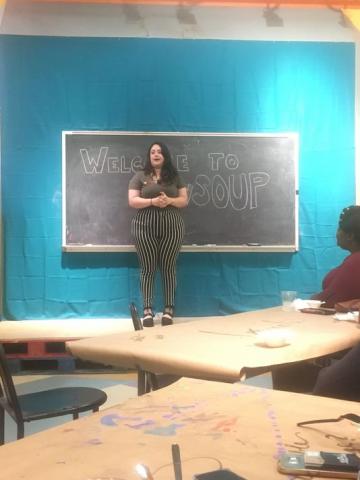Food Recovery Network at FSU wins local community project competition

On Feb. 13, 2018 in the nearly empty Tallahassee Mall, a registered student organization, Food Recovery Network at FSU, won a local community project competition. The competition, called SOUP, is an innovative concept that first began in Detroit five years ago and is now active in many cities around the country.
The event works by inviting local community members to attend the SOUP event and donate a suggested amount of around $5, which covers the cost of soup and salad. Then, local groups present ideas for community projects for four minutes and take questions before putting the ideas to a vote. The idea with the most votes wins all the donated money.
For the third ever Tally SOUP, organizers chose to host the event at The Sharing Tree, an ecofriendly source for art products. The shop sells reusable art, knick-knacks and jewelry, as well as a host of other materials. They also work with local K-12 educators to provide resources they can use in their classroom.
Director of the Food Recovery Network at FSU, Gabrielle Maynard, first heard about SOUP through a friend who facilitates the event, and decided to enter the competition to secure some funds for supplies needed to perform the daily recoveries.
Since its conception in Fall of 2014, the group has recovered 35,000 pounds of food from Figg Performance dining hall. This food is recovered from Monday to Thursday and given to partners in the Tallahassee community, including the Kearney Center, CARE Tallahassee, Capital City Youth Services, Food Not Bombs Tallahassee and others.
The group has succeeded in their mission and plan to expand to other dining halls.
“Our biggest challenge thus far has been recruiting the hands we need in order to be able to transport food,” Maynard said. “Finding sources of food waste is the easy part, but finding volunteers who are willing to put in the manual labor has proven to be a bit of a struggle.”
Two other groups presented their ideas as well. One group wanted to start-up a program that will focus on providing autistic children with social activities to help them make friends and learn to operate better in social situations.
A presenter for Let’s Stay Connected, pitched a new program that aims to connect working 25-50 year olds. Moniece Jackson, the founder of Let’s Stay Connected, highlighted how difficult it could be to find events for older singles and plans to host these kinds of activities to combat the issue.
The overall amount raised was $150. Food Recovery Network plans to use the funds to buy aluminum cases to hold the recovered food. The group’s main challenge is recruiting enough volunteers. Learn how you can volunteer on their Facebook page.
